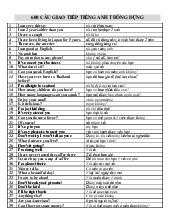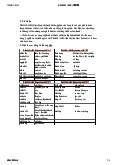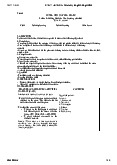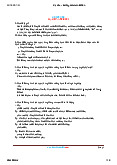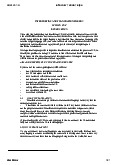


Preview text:
23:49 28/7/24 Reading TANG 1 - abc HỌC VIỆN NGOẠI GIAO
ĐỀ THI CUỐI HỌC KỲ I (2021-2022)
KHOA TIẾNG ANH
TIẾNG ANH NGOẠI GIAO I – K47C
Kỹ năng: Đọc hiểu
Thời gian: 75 phút (Sinh viên Khoa tiếng Anh làm bài trong 90 phút)
(Sinh viên được dùng từ điển đơn ngữ)
The Battles to come over the benefits of working from home By Austan Goolsbee
on The New York times, July 20,
1. Millions of Americans have gotten a taste of working from home during the pandemic, and, boy, have they liked it.
2. But battles are coming. People tend to think the fights will be over whether employers
will allow remote work in the future. But a more vexing struggle may be over whether
employers take most or all of these newfound benefits for themselves not – by
prohibiting remote work but by expecting more hours from employees once the labor
market is not as favorable to workers as it is right now.
3. Yes, some employers will probably fight the remote work trend. David Solomon, the
Goldman Sachs chief executive, called remote work an “aberration,” and the firm’s
bankers returned to the office in June. Across town, James Gorman, the Morgan Stanley
chief executive, announced that his company’s employees would return by September
and said, “If you want to get paid New York rates, you work in New York.”
4. But more frequently, employers seem desperate to find workers and unlikely to want to
anger them. The Labor Department reported that the number of open positions reached
a record of 9.2 million in May. With offers of signing bonuses, higher wages and
expanded benefits, many workers are
in the driver’s seat right now. It’s easy to see
employers agreeing to these workers’ desires. Indeed, many commentators have
declared that the United States is entering a “golden age” for remote work.
5. Many economists believe that increased work from home will last because it can raise
the productivity of employees, thanks in part to fewer pointless meetings, less
distraction and, most of all, a lack of commuting.
6. According to the Census Bureau, Americans spent, on average a record 55.2 minutes a
day commuting in 2019, before the pandemic. One in 10 spent more than two hours a
day traveling to and from work. In dollar terms, not having to commute five to 10 hours
per week is like getting a 10 to 20 percent raise. For someone with average hourly
earnings in 2021 (over $30), that time is worth $7,000 to $15,000 per year. Looked at
another way, the monetary value of the saved commuting time would be one of the
biggest tax cuts the middle class had ever received. If your pay is higher than average or
your commute is longer, your benefit is worth even more. about:blank 1/3 23:49 28/7/24 Reading TANG 1 - abc
7. No wonder so many people want to work from home.
8. But will workers who get to stay home receive the full value of this bounty, or will
employers take it for themselves?
9. It’s not hard to see how employers could. With all the commute time freed up, what is
to stop them from simply asking employees to work longer from home – to prepare that
report before the meeting starts in the morning or to answer emails or contact clients or
file those forms at all hours of the day or night? Blurring the lines between work and
the rest of life does not have to benefit workers in the end. Indeed, it was the thing that
worried people about working from home before the pandemic began.
10. Economists call this an “incidence” question: who ultimately benefits from a windfall.
It’s just like a tax incidence question: Economists routinely analyze whether consumers
or sellers truly end up paying when, say, a state raises its sales tax.
11. The first rule of incidence is that it depends on the conditions in the marketplace. The
incidence of the working-from-home bounty will depend on whether labor remains
scarce over the long run and on how powerful the employers are. Who needs the other
side more? If workers have many options and can quit jobs that encroach on their time,
they will tend to keep the bounty. If employers can choose among lots of workers,
working from home may end up being much less favorable than it first seems.
12. The job market seems tight right now, and if employers put extra burdens on workers, it
would probably be a serious error. They would have a hard time attracting people and
would probably face a wave of resignations. But will that still be true in a few years,
when things are back to “normal”?
The Battles to Come Over the Benefits of Working From Home - The New York Times (nytimes.com)
I. Words and phrases explanation
Explain the following words and expressions, as used in the article
1. In the driver’s seat (para 4)
2. Blurring the lines (para 9) 3. A windfall (para 10)
4. Encroach on their time (para 12)
II. Comprehension questions
Read the article and answer the following questions, using your OWN words.
1. Why have many commentators claimed that the United States is entering a “golden age” for remote work?
2. Why do many economists believe that the trend of working from home would continue?
3. How could the employers benefit from remote work?
4. Who will eventually gain the work-from-home bounty? III. Word search
Find words or phrases which carry the following meaning in the article.
1. A reward, often in the form of money. about:blank 2/3 23:49 28/7/24 Reading TANG 1 - abc 2. Annoying or troublesome.
3. An action which is regarded as abnormal or unacceptable.
4. Absolutely wanting or needing someone/something. For TA students only:
IV. Summarize the article in ONE sentence using your own words. about:blank 3/3
